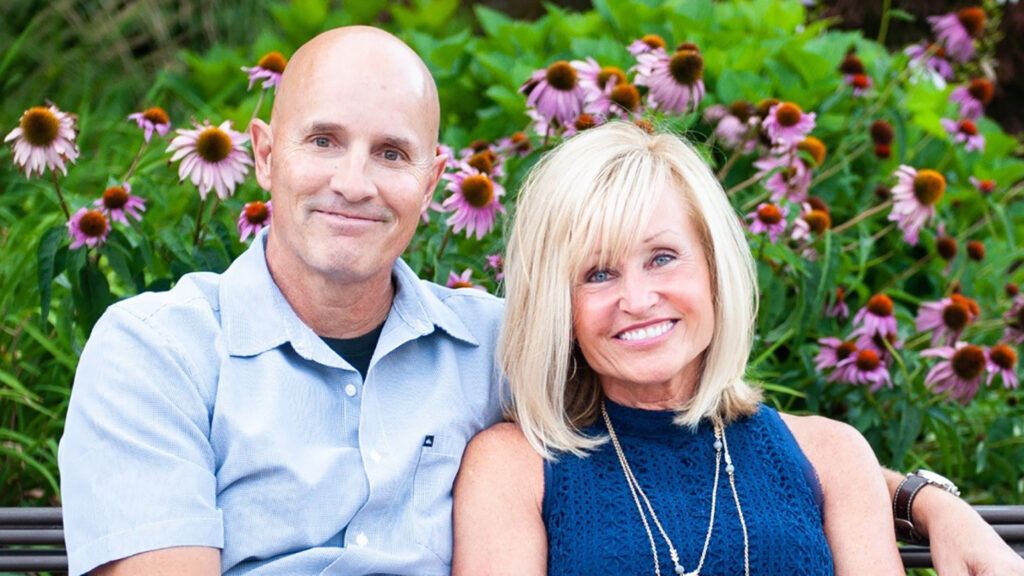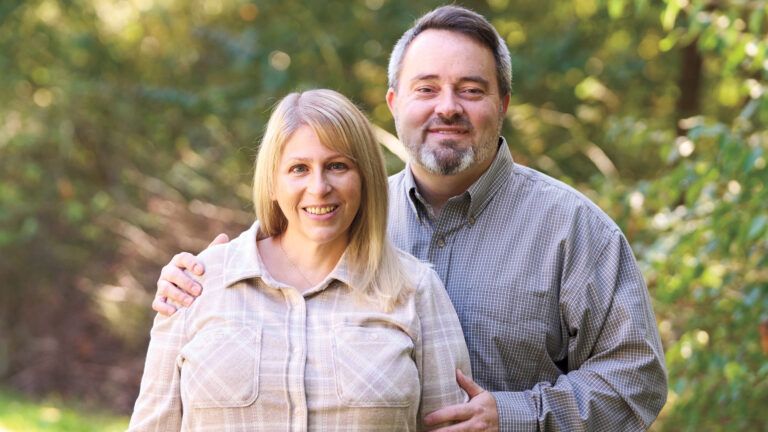Dave and Ann Wilson’s marriage received a shocking wake-up call on their tenth wedding anniversary. Dave thought their relationship was great—a 9.8 out of 10. He assumed Ann was on the same page. Until she turned to him after their anniversary dinner and said, “I’ve lost my feelings for you.”
As Dave shared in the February 2019 issue of Guideposts, Ann’s revelation changed the course of their marriage. The couple, who embarked upon a journey to rediscover the joy and romance in their relationship, have since shared their breakthrough with thousands of people at marriage conferences across the country.
We caught up with the Wilsons to chat about their new book and their marriage philosophy.
Guideposts.org: The title of your book is Vertical Marriage: The One Secret That Will Change Your Marriage. What do you mean by vertical marriage? What’s the secret?
Dave Wilson: The short answer would be that we all go in to relationships and marriage with a hope and belief that the person we’re dating and marrying is [going to] bring us happiness. But…at some point the marriage or the relationship lets you down. Often at that point people think “I married the wrong person” and they think the right person’s out there somewhere else. What we’re saying is you’re actually looking in the wrong place.
No person will ever be able to bring you the happiness you’re trying to get. That only comes from the One who made you. That’s what vertical means, when you go to God you find out that the creator actually is the only one that can fill that void because the void you’re feeling is really spiritual in nature. There’s no person that can ever really satisfy you, you have to find that from Christ. That’s what vertical marriage means.
Guideposts.org: How do you live out the idea of vertical marriage in practical ways?
Ann Wilson: We became very intentional about spending more together. The first thing we did was we started spending time with each other daily just catching up. That’s hard to do when you’re busy and exhausted. Especially when your kids are little and you don’t even have time to talk to each other. So that was big just to catch up every day and ask the question “how are you doing?”
Dave: And we started praying together daily. [Praying] is connecting not just horizontally with one another but vertically with Christ.
We also have a weekly date night. Go out, pull yourself away from the kids and spend some time connecting with each other. Most couples don’t do that, but it’s a discipline that needs to be so important it gets locked in to your calendar and you make it a priority to get away. Our kids are grown now and when they were little it was hard to get away and sometimes you feel bad getting away from them.
We encourage couples to take an annual trip to get away. You take your car in for a tune up, you need to take your marriage in and pour some time and energy in to the most important relationship we have on this planet.
Guideposts.org: In the book you identify four patterns of conflict resolution: win, yield, withdraw and resolve. What are some of your tips for how to handle conflict and find resolution in a healthy way?
Dave: I was a withdrawer. I didn’t like conflict and I would avoid it at all costs. I watched my mom and dad get divorced and grew up thinking that conflict was bad and you [should] avoid it. That’s a really bad idea—you need to step in to it, you need to be willing to have the courage to say “We’ve got to talk about this.” One of the first steps is go there. Don’t run away from conflict.
Ann: I’m the one that was the “winner,” so I entered in to conflict easily and I was all about talking about [problems], but I would also use my words as weapons. So my tip would be to go to God first and ask this question: “God, should I say it?”
And then the next question I would ask God is “When should I say it?” That part was really hard for me because I want to deal with [conflict] right away. But if you’re tired or you’re stressed or you’re hungry that’s not the time.
Dave: We always say that resolving conflict is about two things. One is skill. You have to have some skills, like knowing how to actively listen. The other is attitude. You have to have the attitude that “I’m not right. I’m not better. I consider my spouse more important than me, I consider her motives and thoughts and concerns just as important, or more important than my own.” Resolution is the goal.
Guideposts.org: You identify anger as a “secondary emotion” in the book. What do you mean by that and how does it apply to conflict resolution?
Dave: [It blew] me away that psychologists referred to anger as a secondary emotion, meaning we often
skip right by an emotion we’re not comfortable with. I knew as soon as I read that that [I was using
anger] because I’m not comfortable with emotional hurt. I was comfortable with anger, I was
uncomfortable with emotional hurt and so I skip right over it and blow up. Obviously, that doesn’t work
very well.
Guideposts.org: What are the most common misperceptions about marriage that you have encountered?
Ann: I think women a lot of times are disappointed in the reality of their relationship. A lot of times women feel like they’re invested but their husbands aren’t invested and they’re not sure what to do with that.
It’s amazing to me that we go to school and we’re trained to have a career but most of us have little or no training on how to have a great marriage. A lot of people come in to marriage with this 50/50 mentality of “I’ll do my part, you do your part.” But we’re a bad judge of distance when it comes to marriage. I might give 50 percent and look at my spouse and think they’re not giving 50 percent. Then I might pull away and think I’m not going to give that much if he’s not giving that much.
Guideposts.org: What do you hope people take away from your book?
Dave: My biggest hope is that they would realize the only place to find what they’re really looking for is in a relationship with Christ. That’s the point of vertical marriage is Christ really does change everything.
Ann: When we keep our eyes focused on Jesus and that vertical piece, it’s not that marriage is perfect but man, it really can be so much fun.
This interview has been edited for clarity and length.





